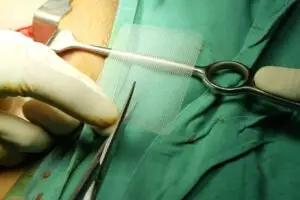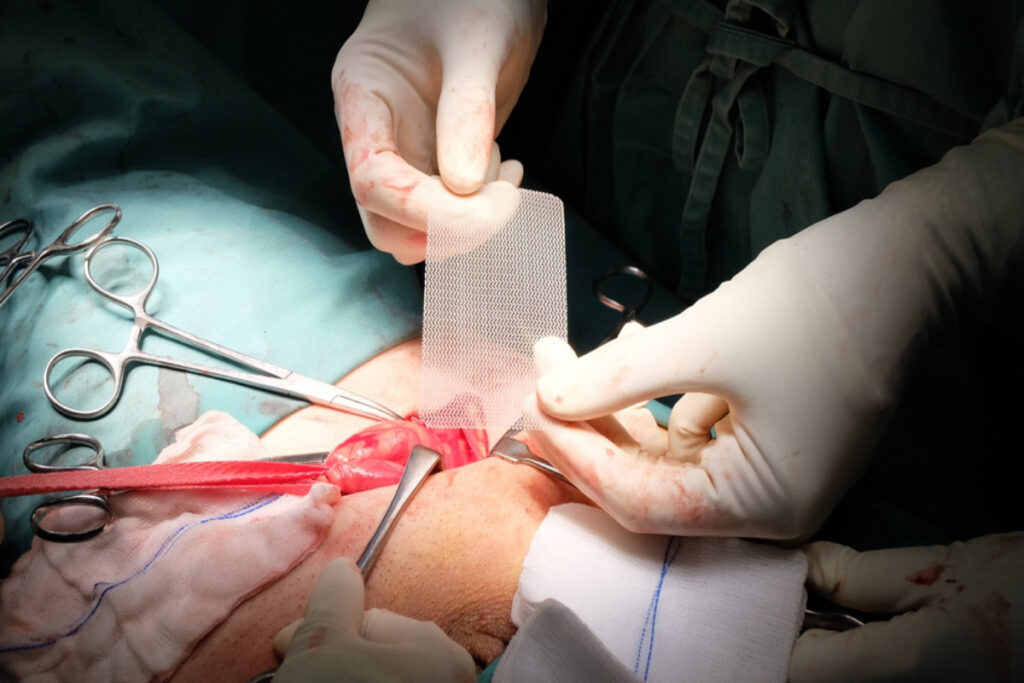
Nevertheless, certain types of hernia mesh exhibit a high incidence of failure and may result in severe or potentially fatal complications. Occasionally, postoperative complications may manifest for months or even years following the implantation procedure. Patients may display severe symptoms that are straightforward to detect or subtle symptoms that are more challenging to identify. It is possible in some circumstances to have many symptoms at once. The most prevalent indications of hernia mesh complications are as follows.

Pain and Discomfort
Complications related to hernia mesh are frequently accompanied by pain and discomfort in the testicles, groin, leg, abdominal region, and stomach. The patient may experience a sensation of rigidity or stiffness in the abdominal region. Sometimes, bruising and swelling appear along with these symptoms.
To apply for free, call (877) 735-0016
Bleeding & Infection
One obvious risk of hernia mesh is persistent infections. Certain infections can be quite severe, resulting in patients experiencing inflammation and a sensation of warmth coming from the surgical site. There is some evidence that hernia mesh increases the incidence of seroma, which is the accumulation of fluid around an implant. The accumulation of fluid may lead to secretions that may suggest a possible infection.
Bulging
Patients may report a sensation of burning in the vicinity of the surgical site or the presence of a protruding bulge through the skin. Bulging may result from mesh dislodgement or migration, leading to inflammation and discomfort. This may also result in an infection, which could elicit a sensation of burning. Some patients may have skin rashes, which usually appear close to the wound or bulge. These bulges could take a while to develop in certain people. Others can have a rapid growth of these bulges.
Nausea
Nausea is a common complaint that might indicate a variety of health issues. But if a patient has a hernia mesh, it may indicate more complications. For instance, the mesh could have moved into the intestines and blocked them. It may have triggered an infection in the digestive tract, making food difficult to digest. Prolonged nausea may result in potential health complications such as dehydration and imbalances in electrolyte levels.
Complete a Free Application form now
Burning
It is not uncommon to experience warmth or elevated temperature in the region of the surgical site where the implant is located, particularly if the device has become dislodged, reduced in size, or disintegrated. The sensation of burning may also suggest that the device has resulted in an infection. The onset of this burning sensation may vary depending on the patient, with some experiencing an abrupt start while others may notice a gradual increase over time.
The sensation of burning may start gradually or abruptly. In the case of patients who have been prescribed antibiotics, they may experience a temporary alleviation of symptoms as the medication works to reduce inflammation. However, the patient may experience a recurrence of the burning side effect upon discontinuation of the medication.
Lethargy
Fatigue is a common symptom experienced during the recovery period following implantation surgery. However, if you haven’t been feeling energetic, it might mean your body isn’t adjusting well to the implanted device. For instance, polypropylene mesh occasionally causes discomfort in individuals. Patients with lethargy frequently experience weariness because their bodies are working nonstop to combat infection. Fatigue is only one symptom of a persistent infection; others include fever and inflammation.
Constipation
A malfunctioning mesh in the abdominal region may lead to gastrointestinal issues, including but not limited to constipation and inability to expel gas. This condition is frequently related to the compression exerted by the mesh on the colon, small intestinal tract, and stomach. It is a more prevalent occurrence among patients who have developed fibrous tissue due to umbilical hernias.
In addition to being uncomfortable and even harmful, constipation can result in fissures, hemorrhoids, or flatulence. In cases of severe constipation, patients may experience fecal impaction or prolapse of the rectum due to excessive straining during defecation.
Bowel Obstruction
In certain instances, a malfunctioning hernia mesh may result in a bowel obstruction. This may result in nausea and vomiting, as well as problems peeing or defecating. This disorder may require bowel removal surgery in extreme cases.
Erectile Dysfunction
Sexual dysfunction is a common side effect of mesh complications, especially in patients with inguinal hernias. This might be due to the mesh causing irritation or inflammation or a nerve being entangled in the device. In certain instances, the spermatic cord may become attached to the device, leading to a condition of erectile dysfunction.
Some men who have experienced difficulties from a mesh hernia have also reported a lack of feeling and an inability to have an orgasmic experience. Swelling, slight discomfort, and a shrinkage of the testicles are other signs. According to research findings, mesh complications may result in decreased blood supply to the testicles, which could potentially lead to a medical condition necessitating the removal of the affected testicle.
Hernia Recurrence
While utilizing mesh to treat a hernia typically lowers the risk of recurrence, mesh problems can sometimes result in the hernia returning. The mesh can become detached post-surgery and migrate through the abdominal region. This may result in severe problems such as fistulas, adhesions, abscesses, intestinal obstructions, perforations, and/or hernia recurrence.
Migration can occasionally result in severe discomfort. Other times, individuals won’t have any symptoms until the detachment worsens their condition. Hernia recurrence can be due to several factors, including detachment but also the patient’s general health and lifestyle. However, this might make it harder to verify that the symptom is indeed caused by the failure of the hernia mesh.
What to Do If Your Mesh Fails
Certain signs of mesh failure, such as infection and obstructed bowels can be fatal. If there are any signs of mesh failure, it is crucial that you promptly consult with a doctor. The doctor will conduct a physical examination and utilize imaging techniques such as X-rays, MRIs, or other methods to assess the condition of the mesh.
In most cases, the only option for treating mesh that has failed is to surgically remove it. Revision surgery may be a possibility, so be sure to discuss it with your doctor. Before starting surgery, doctors may not be aware of the full scope of the issue, and you could need more than one procedure. If you intend to file a lawsuit, you should ensure that the mesh is preserved as evidence.
Can I File a Lawsuit For a Mesh Hernia Failure?
You could be entitled to financial compensation if you experienced issues with your hernia mesh. You will need to retain a highly-skilled lawyer to help file your claims. The attorney will examine your medical records and assess whether pursuing a hernia mesh case is a viable option for you.
Get Lawsuit Loan for Hernia Mesh Lawsuits from High Rise Financial
Do you need risk-free legal funding for your hernia mesh lawsuit? Call us today at (866)-407-6404 to schedule a simple initial consultation. Our trusted team will be happy to speak with you and assist with your lawsuit loan application.
Call or text (877) 735-0016 or fill out our form to apply today for free.


